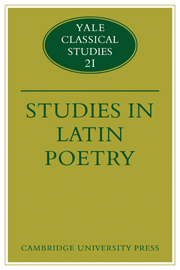Book contents
- Frontmatter
- Contents
- The Saturnian Verse
- The Menaechmi: Roman Comedy of Errors
- Imperator histricus
- Nine Epigrams from Pompeii (CIL 4.4966–73)
- Obscura de re lucida carmina: Science and Poetry in De Rerum Natura
- Catullus 64 and the Heroic Age
- Bacchus and the Horatian Recusatio
- Two Horatian Proems: Carm. 1.26 and 1.32
- Ovid and the Law
Catullus 64 and the Heroic Age
Published online by Cambridge University Press: 10 January 2011
- Frontmatter
- Contents
- The Saturnian Verse
- The Menaechmi: Roman Comedy of Errors
- Imperator histricus
- Nine Epigrams from Pompeii (CIL 4.4966–73)
- Obscura de re lucida carmina: Science and Poetry in De Rerum Natura
- Catullus 64 and the Heroic Age
- Bacchus and the Horatian Recusatio
- Two Horatian Proems: Carm. 1.26 and 1.32
- Ovid and the Law
Summary
In Poem 64 Catullus has encapsulated a great deal of the heroic world within the space of four hundred lines: two relatively brief moments of time (the meeting and wedding of Peleus and Thetis and Ariadne's awakening on the shore of Dia) are filled out by flashback and prophecy so that the range of reference extends from the first voyage in history to near the end of the Trojan War. The poem becomes an epitome of the whole age of heroes, and its central meaning is defined by the poet's attitude to that age and by his conception of its relationship to his own period. Set against the heroic period, in a moralizing epilogue, is a highly colored vision of Catullus' own times (397–408). The theme of degeneration through the ages goes back to Hesiod, but Catullus dispenses with the older poet's first three ages in order to make a two-member contrast. Once gods mingled with men. So, in the primary instance in the poem, they came to the wedding of Peleus and Thetis. So Jupiter attended sacrifices made to him, Bacchus led his worshippers at Delphi, and Mars, Minerva, and Diana encouraged their favorites in battle. Now, spreta pietate, man's guilt is so great that the gods will no longer join him in bodily form. The epilogue is not an afterthought. The contrast of ages balances the address to the heroes in 22 ff. and asserts the fundamental antithesis of the poem.
- Type
- Chapter
- Information
- Studies in Latin Poetry , pp. 169 - 192Publisher: Cambridge University PressPrint publication year: 1969

